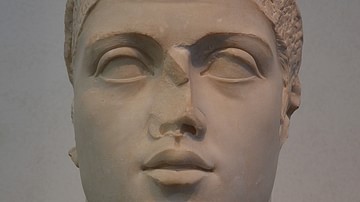Search
Did you mean: Lysander?
Search Results

Definition
Olympias
Olympias (c. 375-316 BCE) was the second wife of Philip II of Macedon (r. 359-336 BCE) and the mother of Alexander the Great (r. 336-323 BCE). Olympias was the driving force behind Alexander's rise to the throne and was accused of having...

Definition
Antipater (Macedonian General)
Antipater (c. 399-319 BCE) was a Macedonian statesman and loyal lieutenant of both Alexander the Great and his father Philip II of Macedon. As a regent in Alexander's absence, Antipater subdued rebellions and mollified uprisings, proving...

Definition
Battle of Gaugamela
The Battle of Gaugamela (1st October 331 BCE, also known as the Battle of Arbela) was the final meeting between Alexander the Great of Macedon and King Darius III of Persia. After this victory, Alexander was, without question, the King of...

Definition
Perdiccas
Perdiccas (d. 321 BCE) was one of Alexander the Great's commanders, and after his death, custodian of the treasury, regent over Philip III and Alexander IV, and commander of the royal army. When Alexander the Great crossed the Hellespont...

Interview
Interview: Kutuzov a Life in War and Peace by Alexander Mikaberidze
Join World History Encyclopedia as they have a chat with author Alexander Mikaberidze all about his new book Kutuzov: A Life in War and Peace, published by Oxford University Press. Kelly: Thank you so much for joining me today, Alex. It...

Image
Alexander Sarcophagus (detail)
The Alexander Sarcophagus is a late 4th century BCE stone sarcophagus adorned with bas-relief carvings of Alexander the Great. The Alexander Sarcophagus is one of four massive carved sarcophagi, forming two pairs, that were discovered during...

Definition
Battle of Issus
The Battle of Issus, on 5 November 333 BCE, was Alexander the Great's second battle against the Persian army and the first direct engagement with King Darius III, near the village of Issus in southern modern-day Turkey. It was a major victory...

Definition
Battle of the Granicus
The Battle of the Granicus in May 334 BCE was Alexander the Great's (356-323 BCE) first major victory against the forces of the Achaemenid Empire. Alexander had crossed the Hellespont with his combined Macedonian and Greek forces and stepped...

Image
Alexander Severus (Artistic Facial Reconstruction)
A photorealistic artistic reconstruction of what the Roman emperor Alexander Severus (r. 222-235 CE) may have looked like. Based on contemporary and near contemporary descriptions, as well as archaeological evidence. Pictured alongside...

Image
Alexander Severus
Portrait of Roman Emperor Alexander Severus (reign: 222 – 235 CE), from Ostia Antica. (Palazzo Massimo alle Terme, Rome)